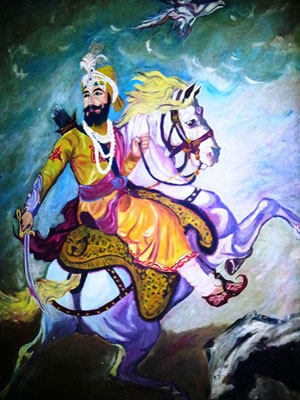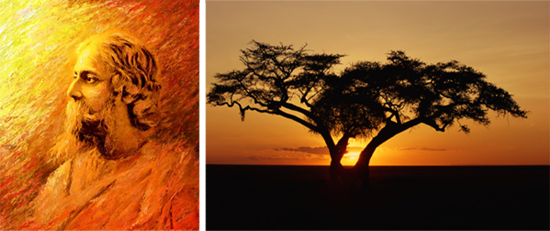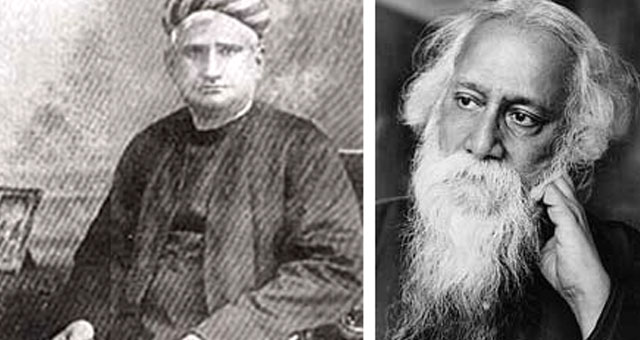(Courtesy: P. R. Commumication Age, Calcutta, December 1999 issue.& The Sikh Review in July 2007 issue)
Translator’s note: This write up is a translation of an essay in Bengali by Rabindranath Tagore which he had written in mid-twenties. I read it decades back which was long lost in oblivion. Yet, this essay rang me a bell while I recently attended a function of the Sikhs at Delhi in celebration of the Tercentenary of Khalsa and also read a few publications there on this occasion where I noted the unqualified esteem of the Sikh community for Guru Govind Singh which is shared equally by the non-Sikhs as well, at least those who read about re-vitalization of the Sikh spirit under his leadership through a number of inspiring poems/essays of Tagore on the Sikhs and/or from other sources. Yet, in this essay Tagore has dispassionately compared Guru Govind Singh and Shivaji, particularly with Guru Nanak to highlight their slips from the broader humanism with which Nanak set his ball of Sikhism rolling. I am very much hopeful, my Sikh friends will take the critique of the Poet of their highly esteemed Guru Govind in its true spirit for an objective analysis of the Sikh history. It is notable that the Poet himself realizes that Guru Govind’s tailoring of Nanak’s liberalism was out of historical and social compulsions of that time. Yet, the Poet cannot help his disappointment with Sikhism having to discount the eternal human values propounded by Nanak where martial values had elbowed in, that also failing to assume an all India dimension in the Shivaji line while that too flopped for want of a strong national base. However, the remnants of Sikhism is still precious to us and had the Poet been among us, he would certainly be happy to note to-day’s endeavor for its preservation, as is being particularly notable in North India in 1999, the year of the said Tercentenary.
The main difference of the Sikh history with the Marathas’ is that Shivaji, the leader of the latter launched his movement with the clear objective of establishing a Hindu sovereignty. His conquests, expansion of empire and elimination of enemies were all part of this all India master plan
On the other hand, the Sikh history started as one of spirituality. The liberty which Baba Nanak perceived was not of a statehood. The iconic religion confined with geographical limits, racial concepts and rituals to which the entire mankind does not have a right, was not Nanak’s. His heart was liberated of all such fetters and he dedicated his life preaching this spirit. Those who fell for it and accepted his baptism, were known as Sikh (a disciple). Irrespective of caste or creed everybody had a right to it. That a racial history would emerge out of Nanak’s followers, was not evident at the beginning.
But the brutal tortures of the Mughols congregated those disciples into an identifiable community. Putting a halt to their religious mission amidst the mass at large, they concentrated on self defence. The said external pressures resulted in their emergence as a cohered race.
The last Guru of the Sikhs dedicated himself particularly to this task. He felt the need of building up the Sikhs as a powerful race at the cost of Nanak’s concept of religious mission for humanity at large. Indeed this is not the task of a prophet but an army general’s, and/or politician’s. Guru Govind had these virtues. With his outstanding perseverance he converted his religious community into a martial one and vacated the seat of Guru. He upstaged Nanak’s perception of human liberty and stamped deep in the minds of his followers the urge for being relieved of all animosity around. No doubt this sparked up the Sikh might for a few moments in our history and that did generate high martial skill. But a lot of the capital with which Baba Nanak set them on their pilgrimage was spent up on this diversion with their objective lost/
The subsequent history is only of battles and territorial expansion. More the Mughol power was on the decline, more successful the Sikhs were, followed by increasing temptation for sovereign expansion.
So long the opponents are stronger, the motive for defence remains supreme which acts as the uniting force. As the external pressure eases out what can hold the arrogance of triumph? The martial power that builds up in the process of self defence, who can rein it then for self development instead of hurting others? For sake of short term need, Guru Govind put down that faculty which might have. Instead of Guru, he gifted the Sikhs sword. When he passed away, the supreme truth that Nanak preached got captive in Granth Sahib. No more it flowed through Guru legacy into the life stream for fruition among human society at large. It stagnated at a point.
Their power in this situation turned out to be a genie out of the bottle. Rampant became scramble and faction amidst which up rose Ranjit Singh. He held the Sikhs together for sometime but that was with muscle power alone. As he was the strongest, he could quell the rest.
He who unites by might, does it by mayhem. Besides, he accomplishes his task by crippling love which alone is the eternal foundation of unity. Ranjit Singh held firm all the Sikhs together by all trickery for his self interest. He did not inspire the Sikhs with any noble idea that might bind them even after he would pass away. He was an example of self dedication even based on rampant deceit. His greed was unbounded. His only credit was, he achieved whatever he had wanted. He controlled himself only where the British had dictated so. However, on the whole, he was successful. But nothing imperils one more than one’s success, while it obscures wisdom and boosts greed. It is then as good as suicidal. Nanak, the pioneer of Sikhism, is a bright example of failure. For that he had had enough reprimand from his merchant father. The setback in his salt trade at Nanak’s hand is well known. He was poor. But the inspiration which enabled the Jat peasants to slight all sufferings including death, and to grow into a mighty institution, was nourished by this poor hermit/
On the other hand, the Maharaja, who is an example of success, who suppressed all the enemies of the Sikhs undaunted by all adversities, eruption of whose fire set afire the evening sky of the setting sun of the Mughol empire at the advent of the rise of the British, what did he leave behind for the Sikhs? It was disunity, mistrust and lack of discipline.
Those in the forefront among the Sikhs, learnt from their ‘successful’ king that ‘might is right’. They did not learn sacrifice and modesty, they forgot the maxim“ victory lies where holy principles do that is- the spiritual power with which modest Nanak held them, the almighty king gutted it out resulting in extinction of the ‘Sikh’ star in the sky of human history after its brief glitter. To-day, the Sikhs have stagnated, reduced to a small community. No more they are growing over a few centuries they did not gift mankind with a human Guru any more they did not add any more to the man’s treasure of wisdom and spiritual dedications.
No doubt, Nanak’s disciples are competent warriors to-day. But I don’t think that sole glory of Nanak’s posterity was destined to be in their martial engagements in various parts of the globe as we find to-day (the Poet obviously refers to the periods of the world wars).(Translator). Nanak’s dedication was not for their parades in the army barracks alone in the wide arena of humanism. (I am sure, the Poet would have been very happy to see how the Sikhs to-day are dominating the mainstream of our national life also, besides the army barracks, if he were among us.) (Translator)
Nanak’s call to his disciples was to be free from self-centeredness, sectarian religion and spiritual numbness to give the widest accomplishment to their humanism. Guru Govind moulded the Sikhs for a specific need and so that it does not slip into oblivion, he firmly stamped this need in their nomenclature and attire. Thus, he harnessed the Sikh’s strong current of humanism from diverse courses to a particular one. Thus, the Sikhs were caught in the mould of that specific need and of course attained solidarity.
When the Sikhs thus became ‘useful’ instead of being liberal humans, the powerful rulers utilized their skill toward their own end and till now such exploitation is going on. At Sparta, when Greece shrank its humanism for a particular purpose, it was indeed able to fight, but only upon pruning itself as competence for battle is not man’s ultimate goal. There are a lot of such examples of man dwarfing his nobility for the immediate need and sacrifice of humans at the altar of the urge for shortsighted gain is going on. The icon thirsty of human blood may happen to be the society, state, religion or any other so called ’cause’ that spoils human virtues with its mass hypnotism.
To me, the end of Sikh history seems sad. When the river with destination sea emerges from the snow white peak of lofty mountain only to be lost into a midway desert and loses its momentum forgetting its own music, that futility is tragic. Similarly, when the holy impulse founts from the devotees’ heart to fertile the earth with spirituality, it is sad it perverts into the mud crimson red with the soldiers’ blood, with its early glory no more left. The Sikh history had its slips, due to temptation of revenge or other narrow objectives, from a wider fulfillment in the field of humanism, neither had lesser success within national limits. The empire of Ranjit Singh was his exclusive. Govind Singh’s struggle with the Mughols was only of Sikh community. He could not transmit their resolution further beyond.
The difference of the Sikh history with the Marathas’ is notable here. Shivaji’s endeavour was not confined to a small community. His objective to liberate the Hindus and their religion from the Muslim tyranny was far flung unlike Guru Govind’s which remained confined among his disciples. No doubt, Shivaji’s goal was to rebuild the history of the entire Indian sub-continent. Guru Govind and Shivaji were more or less contemporaries while the liberalism of Akbar declined resulting in provocation by the Mughols of all non-Muslim religions and communities for a defensive stand.
All the internal and external shocks at that time sponsored a religious enterprise at various places in India. The turmoil in the Hindu religious life then crystallized around various saints, particularly in the Deccan, and had manifestation in various missions. Amidst this consciousness, stoked up by the torturous Aurengzeb, emergence of a hero like Shivaji to earn victory for India’s primeval religion was natural.
Again, in the west, the new inspiration of Sikhism overflowed the hearts of the Sikhs. That is why, the Mughol atrocities could not stifle it. On the contrary, it fanned up like a fire. Notwithstanding the identical external blows and the internal inspirations, their manifestations through Guru Govind and Shivaji were different in nature.
Guru Govind had many battles with the Mughols, but in a haphazard manner. Revenge and self-defence were their main objectives. [History records that Guru Govnd’s father iTeg Bahadur was put to death by Aurengzeb for his refusal to embrace Islam in 1675 A.D. His two sons were slain before his eyes in a battle. Govind’s determination to avenge these deaths was largely behind his relentless fight against the Mughols, as some historians observed which obviously misled Tagore. A quote from Dr. Trilochan Singh’s book ˜Hymns of Guru Teg Bahadur’ may take us nearer to truth“
“These historians fail to study Guru’s concept of martyrdom and of Saviour with the sword who is convinced that he is commissioned by God to establish righteousness, punish the wicked, chastise the tyrants, which also means that the Guru was determined never to use sword for revenge or aggression” (Translator)
But those of Shivaji were in logical steps, not for preposterous avenge, but far sighted for a colossal organization in right sequence. It was not manifestation of a communal emotion, but an enterprise for a great objective. [It is difficult to accept the Poet’s view that the Sikhs worked for communal interest alone while their history is replete with examples coming as saviours of the Hindus also from Muslim atrocities.“Translator”].
Yet, both Sikh and Maratha history ended in similar futility. The reason for this is, an objective cannot be pervasive countrywide based on the dreams of a few. Shivaji could not link his heart with his countrymen’s. So, despite all his move, his intent could not come up as the entire country’s.
If the welfare meant for all cannot be established in their heart, but remains confined among few, it loses its character and turns into a menace for all. What was pure in Shivaji’s mind, became polluted by selfishness of the Peshwas. It could not be so had the communication channels of this ideal among the masses remained open. In that case the great inspiration would get its nourishment in its great receptacle, as the fire of a near extinguishing piece of wood may catch another for its flare up if placed in a stack.
Repeatedly we have noted in our country uprising of vitality only to lose its continuity. Great men come and pass away as the natural advantages to hold and nourish their inspirations are missing here. The reason for this is disunity. Wind borne seeds may drop on loose soil unable to hold manure and, thus, do not sprout there effectively. Our land has endless diversities, be it in our religion, deed, food, language or anywhere for that matter. That is why, floods of emotion pour down, but dry up in dreary sand energy sparks up only to extinguish with a bit of smoke notable endeavours do not become great ones the great men pass away only glaring the incompetence of the mass.
As we compare the rise and fall of the Marathas and the Sikhs, it may be seen that the Sikhs once united on inspiration from a highly noble intent which brought a message of truth without any geographical or ritual confinement neither generated out of a momentary impulse, but is an eternal belonging to mankind at large, to broaden human rights, to liberate their soul, and to reckon where lies man’s fullest glory. At the magnanimous call of this liberal religion of Nanak, for several centuries the Sikh ideal expanded amidst various sufferings. Perception of such a religion amidst all their glorious ordeals, the Sikhs unwittingly laid down the foundation of a unity on a wide scale.
Guru Govind harnessed this spiritual unity of the Sikhs for the purpose of their task at hand. For their ephemeral need, he pruned down this spiritual unity with the goal of a statehood. He uprooted the caste system which stood on his way. Of course, he could do it as Nanak’s liberalism already eroded parochialism from the base which fell into pieces at the very first stroke of Guru Govind. Without this prior preparedness he would not be able to achieve it, however essential, neither this intent to dissolve this all futile divisiveness would shape up in his mind.
But Guru Govind, while strengthening unity, dethroned the very power (i.e. religiosity/ spirituality) which made it feasible, or at least, did coronate its rival partner (i.e. martial values), to corner the former. As a result, some immediate purposes were achieved, but what was advancing toward an absolute liberation, was stranded midway. The Sikhs were thick among themselves, but lost the momentum for the said advance. Their march for man’s ultimate glory halted at soldiery. There the Sikh history terminated.
The objective to which Shivaji dedicated himself was not ephemeral, for which the influence of religious Gurus at Deccan already prepared a ground. So, his inspiration could percolate down the entire Maratha race.
A pot with holes cannot hold water though for a while it may be overflowing. Our society is full of holes, incapable of holding great ideals, resulting in abundance of lifeless parched rituals. In his contemporary Maratha/ Hindu populace Shivaji introduced an inspiration powerful enough to keep its momentum for sometime. But he failed to solidify its receptacle, rather did not even attempt it. He set sail in the stormy sea with his leaky vessel, as its need was imminent. In fact, he wanted these very leaks across. The Hindu society which he aimed to win over the Mughol invasion, ritualistic cracks were at the base of it, which he aimed to turn triumphant in India. Shivaji never stood on any ideal which might heal up all these basic disintegration. His grievance that his own religion was being raped by external forces was natural, but to capitalize that alone to turn his religion as the victor all over India was bound to be futile, as it was being ruptured from within, continuously splitting and insulating man. He never looked inward to realize this menace but took itself as our holy religion. It is beyond man to establish sovereignty of such a fragmented monastic order in such a vast country like India as it cannot be any divine design. A nation merely infuriated by external blows cannot be great or victorious so long it is not conscious of the prudence of unity and its power will not motivate it, at heart and externally also, for an integration on a great ideal. Until then, no external blow, neither the personality or valor of any talent can make it compact or vivacious.
[Publication of this essay of Tagore at this time will be quite relevant to the Tercentenary of Khalsa movement this year. Editor, P. R. Communication Age]






